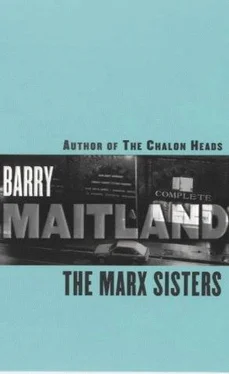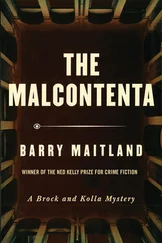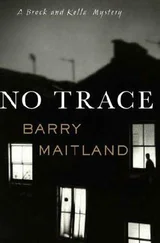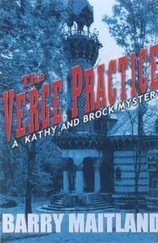Barry Maitland - The Marx Sisters
Здесь есть возможность читать онлайн «Barry Maitland - The Marx Sisters» весь текст электронной книги совершенно бесплатно (целиком полную версию без сокращений). В некоторых случаях можно слушать аудио, скачать через торрент в формате fb2 и присутствует краткое содержание. Жанр: Полицейский детектив, на английском языке. Описание произведения, (предисловие) а так же отзывы посетителей доступны на портале библиотеки ЛибКат.
- Название:The Marx Sisters
- Автор:
- Жанр:
- Год:неизвестен
- ISBN:нет данных
- Рейтинг книги:3 / 5. Голосов: 1
-
Избранное:Добавить в избранное
- Отзывы:
-
Ваша оценка:
- 60
- 1
- 2
- 3
- 4
- 5
The Marx Sisters: краткое содержание, описание и аннотация
Предлагаем к чтению аннотацию, описание, краткое содержание или предисловие (зависит от того, что написал сам автор книги «The Marx Sisters»). Если вы не нашли необходимую информацию о книге — напишите в комментариях, мы постараемся отыскать её.
The Marx Sisters — читать онлайн бесплатно полную книгу (весь текст) целиком
Ниже представлен текст книги, разбитый по страницам. Система сохранения места последней прочитанной страницы, позволяет с удобством читать онлайн бесплатно книгу «The Marx Sisters», без необходимости каждый раз заново искать на чём Вы остановились. Поставьте закладку, и сможете в любой момент перейти на страницу, на которой закончили чтение.
Интервал:
Закладка:
‘We really can’t say yet. But we’d like to get some background information on the lady. You’ve been the family solicitor for some years, I believe.’
‘Indeed, yes. Hepple, Tyas amp; Turton have been here in this office since my father founded the practice sixty years ago, in the same month as the Wall Street Crash. A propitious beginning!’ Despite his concern over Meredith Winterbottom’s death, it was apparent that Mr Hepple was unable to resist the telling of a good anecdote. ‘I have been acting for Mrs Winterbottom and her family ever since she moved here with her husband in 1967. Well, earlier actually, because I did the conveyancing on the house when Eleanor bought it earlier in that year.’
‘Eleanor?’
‘Yes. Meredith and her husband Frank Winterbottom were in Australia at that time. They went out there as soon as they got married, after he was demobbed at the end of the war. Twenty years later they decided to come back and asked Eleanor to choose a house for them in London. He had made a bit of money in Australia-import and export, I think-and I imagine he had in mind a comfortable suburban villa in Sevenoaks or Amersham. Instead Eleanor bought them number 22 Jerusalem Lane, WC2. It was a bit of a shock at first. Frank’s first words to me when they arrived were to put the place on the market again because they weren’t stopping.’
Mr Hepple chuckled at the memory. ‘However, it was an extraordinary thing. The house didn’t attract any buyers for a while, and by the time one came along they didn’t want to sell any more. Meredith was the first to fall for the place. She started to get to know the people living here, and soon found herself caught up in it. Frank discovered that it was quite convenient for doing business in the city, and then gradually he started to feel part of it, too. It is an extraordinary little corner of London, this. I always feel I’m coming home when I walk down the Lane. Are you familiar with it, Chief Inspector?’
Brock shook his head and Mr Hepple beamed, heaped two spoonfuls of sugar into the cup which Sylvia Pemberton placed on his desk, selected a ginger crunch biscuit from the plate she offered round, and leaned back in his chair.
‘It looks quite scruffy, wouldn’t you say? No buildings of great architectural merit. The scene of no great historical events. A bit of a shambles. Yet it is unique, and, to my mind at least, a place redolent of the sort of history which we tend all too often to ignore.
‘The area which we know as Jerusalem Lane is really the whole of this city block, which is divided into two irregular halves by the line of the Lane itself, apparently all that remains of a rural track which once ran from somewhere around what is now King’s Cross down to Holborn. Do you know that the peculiar kink in the middle of the Lane is probably a corner where four fields met and the track had to change direction round them? I think that’s rather wonderful, isn’t it, that we should still have to walk along the boundaries of odd-shaped fields that disappeared hundreds of years ago.
Now although the block lies in the middle of thriving commercial districts-the City to the south and the railway termini at Euston, St Pancras and King’s Cross to the north, and in the other direction, Bloomsbury to the west and Clerkenwell to the east-despite this, Jerusalem Lane has remained largely untouched by development since it was first built up, in a haphazard fashion, by small builders and speculators in the late eighteenth and early nineteenth centuries.’
Kathy tried to catch Brock’s eye, wondering how she could return the solicitor to the present, but Brock, attentive and contentedly munching on a chocolate digestive biscuit, seemed happy to let him continue.
‘This lack of attention from developers was due not to its location or potential, you understand, but rather to the confusing complexity and multiplicity of freeholds, lease-holds and tenancies which established themselves within the block, and which frustrated the most determined attempts to replace the warren of small buildings with something more coherent and profitable. There is that one row on the west side of the block, where an Edwardian developer managed to buy up about half of the street frontage and build that rather flamboyant red brick and stone trimmed office building seven storeys tall (thanks to the recent introduction of Mr Otis’s patent safety lifts), but the rest of the block remained as we see it, a jumble of fragmented ownerships, uses, floor levels and building forms.
‘Now’-Mr Hepple leaned forward over the desk and looked intently at them, as if he was getting to the point of his story-‘because of this, rents in Jerusalem Lane have remained low throughout its history, and within a generation of its construction it had established itself as a small haven for poor newcomers to the city, and in particular immigrants and refugees from Europe. The first such wave was of Russian Jews, fleeing the pogroms of the 1830s, and we can still see the traces of their early occupation of the area in the synagogue at the south end of the Lane, opposite Mrs Winterbottom’s house, and by the name of the public house, The Wandering Jew, across the road in the next block to the north, and of course by the name of Jerusalem Lane itself.
‘After the disturbances in the year of revolutions, 1848, political refugees from Germany, France and half a dozen other European countries found their way to the Lane. Did you by any chance notice the engraving over there by the door?’
‘I did,’ Brock said. ‘It looks like a Dore.’
‘Quite right, Chief Inspector! It is one of Gustave Dore’s scenes of Victorian London, and it is actually a view of Jerusalem Lane as it was in the decades after that influx of refugees from the continent.’
Brock and Kathy got up and had a look at the drawing hanging in its black and gold frame. It showed a narrow street teeming with hawkers, beggars, handcarts and ragged children.
‘Among those refugees, and the most famous of our former residents, was Karl Marx, who lived for most of 1850 with his family in the house of a Jewish lace dealer at number 3 Jerusalem Lane, which most recently has been Adam Kowalski’s home and bookshop. You can see a plaque, mounted in the wall outside the shop a few years ago to record the fact that the Marxes lived there.’ Mr Hepple chuckled and a twinkle came into his eye. ‘It was not a period which the Marx family was to look back on with much nostalgia. They lived in great poverty in two rooms on the second floor, one of which was shared by the whole family: Karl, his pregnant wife Jenny, their three small children, and their maid. The other room was used by Karl alone as his study, chaotically untidy and invariably filled with a fog of tobacco smoke so thick that it stung the eyes of anyone who ventured in. There he worked late into the night on his researches into British capitalism and composing his Address of the Central Committee to the Communist League.’
Mr Hepple beamed as he showed off his knowledge. He paused to gulp down some more coffee, and Kathy, seeing that Brock was showing no sign of wanting to interrupt him, made to speak. Hepple sensed this, however, and got in first.
‘Cramped, cold and spartan as their accommodation was, it at least had the advantage of being only a short walk to the British Museum, for which Marx gained a reader’s ticket in the June of that year, and where he spent the next three months immersed in back numbers of the Economist. Soon after they moved into Jerusalem Lane, Jenny became ill and, fearful of losing her as they had lost their fourth child not long before, Karl sent her to stay with friends for over a month. It was during this period that the maid became mysteriously pregnant and gave birth to a baby boy towards the end of that year. Soon after, around Christmas time, the family was evicted for not paying their rent, and, with the help of Marx’s friend Engels, moved on, firstly to lodgings in Soho, and later, when they inherited money, out to the new suburbs of Kentish Town and Hampstead.
Читать дальшеИнтервал:
Закладка:
Похожие книги на «The Marx Sisters»
Представляем Вашему вниманию похожие книги на «The Marx Sisters» списком для выбора. Мы отобрали схожую по названию и смыслу литературу в надежде предоставить читателям больше вариантов отыскать новые, интересные, ещё непрочитанные произведения.
Обсуждение, отзывы о книге «The Marx Sisters» и просто собственные мнения читателей. Оставьте ваши комментарии, напишите, что Вы думаете о произведении, его смысле или главных героях. Укажите что конкретно понравилось, а что нет, и почему Вы так считаете.












